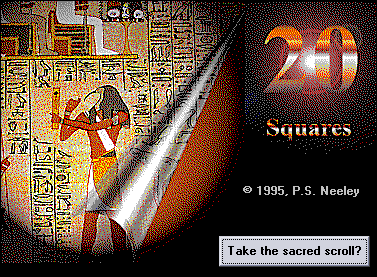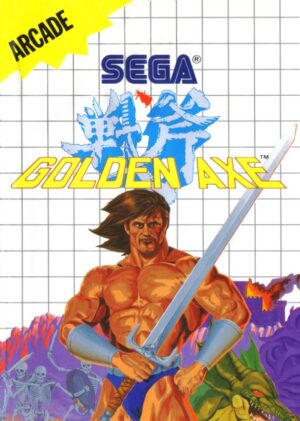Retro Replay Review
Gameplay
20 Squares faithfully recreates an ancient Egyptian “race and bump” board game, putting you in control of five tokens as you compete to reach the final square before your opponent. Each turn, you toss four virtual casting sticks—half-round twigs that mimic the historical method of determining movement. The number of flat sides facing up dictates how many squares you advance, with special rules granting extra turns on zero or four flat sides. This simple mechanic keeps every move exciting and ensures that luck and strategy intertwine.
(HEY YOU!! We hope you enjoy! We try not to run ads. So basically, this is a very expensive hobby running this site. Please consider joining us for updates, forums, and more. Network w/ us to make some cash or friends while retro gaming, and you can win some free retro games for posting. Okay, carry on 👍)
Beyond pure chance, 20 Squares offers strategic depth. Certain spaces on the board are marked with hieroglyphic symbols, providing bonus moves and extra turns. Smart players will aim to land on these squares and will carefully time their bumps—sending an opponent’s token back to the start can dramatically shift momentum. The balance of offense and defense, combined with the unpredictable outcomes of the casting sticks, keeps the gameplay engaging through every match.
Newcomers will appreciate the in-depth tutorial, which guides you step by step through the rules and demonstrates how to read the board. While the basics are easy to grasp, mastering the timing of special squares and effectively using bumps takes practice. An optional hint system can be toggled on or off, allowing you to refine your approach and learn new tactics as you play. Whether you’re a casual gamer or a board game veteran, 20 Squares scales to your comfort level.
Multiplayer support includes pass-and-play hotseat mode against friends as well as a single-player AI that adjusts its difficulty based on your performance. This adaptive challenge means you’ll never face an unbeatable opponent, but you’ll also never breeze through every match. Frequent matches feel fresh, and the replay value is high—each session tells a new story of triumph, near-misses, and surprise comebacks.
Graphics
20 Squares adopts a clean, minimalist art style that honors its shareware roots. The board is laid out in warm sandstone hues, punctuated by authentic hieroglyphic accents and subtle color highlights for special squares. This restrained palette evokes the look of ancient Egyptian artifacts without overwhelming the player with unnecessary details.
Token animations are crisp and purposeful. When you move a piece, it glides smoothly across the board, pausing briefly on bonus squares to emphasize their importance. Bumping an opponent’s token triggers a quick “knockback” animation that feels satisfying without becoming repetitive. There’s no flashy 3D rendering here—just functional visuals that keep the focus on gameplay.
The user interface is straightforward, with clearly labeled buttons for tossing sticks, ending turns, and accessing the tutorial or Mummy Facts. On-screen prompts guide you through each step, minimizing the need for menu digging. Even on lower-resolution displays, text remains legible and icons are instantly recognizable, making the game accessible on a wide range of systems.
While 20 Squares doesn’t push graphical boundaries, its deliberately simple presentation enhances clarity. By avoiding cluttered backgrounds and over-the-top effects, the game ensures that players stay immersed in the strategic ebb and flow, rather than being distracted by unnecessary visual noise.
Story
Strictly speaking, 20 Squares does not feature a traditional narrative or characters—its “story” lies in the historical legacy it brings to life. The game’s manual and in-game “Mummy Facts” snippets weave fascinating anecdotes about Ancient Egyptian culture, daily life, and burial practices. These tidbits appear between turns, offering a delightful blend of gameplay and learning.
Through Mummy Facts, you’ll discover how casting sticks were fashioned, what kinds of gambles Egyptians made in their leisure time, and how this pastime might have held religious or mystical significance. These educational asides create a sense of walking through a museum exhibit, where each roll reveals new context about a civilization that thrived millennia ago.
Although there’s no hero’s journey or scripted plot, the sense of playing a game that predates the pyramids is palpable. You become part of a continuum, tracing strategies that might have amused pharaohs or palace scribes. This immersive historical framing is the closest 20 Squares comes to storytelling, and it succeeds by respecting the mystery and romance of an ancient pastime.
For those seeking a character-driven campaign or dramatic cutscenes, the lack of storyline may feel sparse. However, if you appreciate world-building through cultural detail rather than fictional drama, the game’s educational flavor will keep you engrossed for hours.
Overall Experience
20 Squares delivers a refreshingly straightforward yet surprisingly deep board game adaptation. Its blend of chance and strategy ensures that no two matches play out the same way, and the adaptive AI keeps both newcomers and seasoned players engaged. The learning curve is gentle, thanks to the comprehensive tutorial, but the true challenge lies in mastering board control and maximizing bonus squares.
While the graphics are intentionally modest, they serve the gameplay perfectly—emphasizing clarity and thematic consistency without distracting flourishes. Combined with the informative Mummy Facts, the game offers an educational experience that feels genuine rather than condescending. You leave each session having enjoyed a match and having picked up new trivia about an ancient culture.
20 Squares shines as both a historical curiosity and a solid tactical contest. It’s ideal for players who enjoy classic board games, history buffs who crave context, and anyone looking for a quick yet thoughtful digital pastime. The shareware model means you can sample the experience risk-free before committing to the full package.
In sum, 20 Squares may be simple in presentation, but it packs enduring appeal. Its authentic ancient Egyptian charm, combined with robust gameplay mechanics, makes it a standout title for those seeking a low-pressure, intellectually stimulating challenge. If you’ve ever wondered what your gaming ancestors were up to along the Nile, this conversion is an excellent place to start.
 Retro Replay Retro Replay gaming reviews, news, emulation, geek stuff and more!
Retro Replay Retro Replay gaming reviews, news, emulation, geek stuff and more!









Reviews
There are no reviews yet.